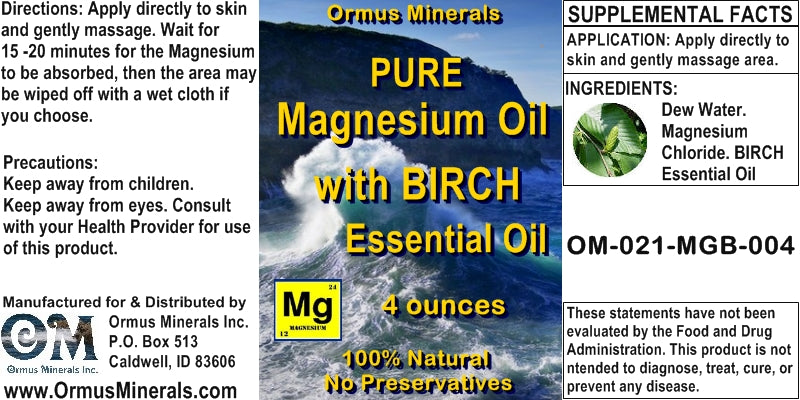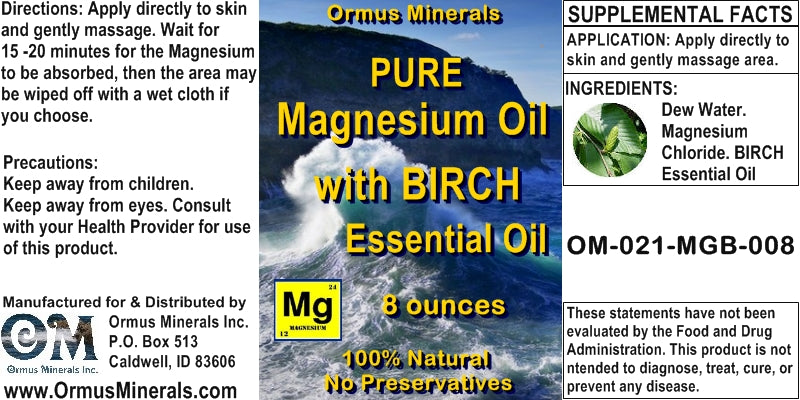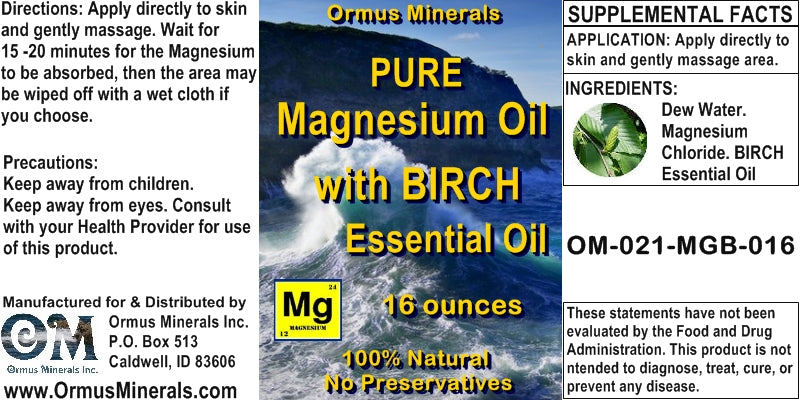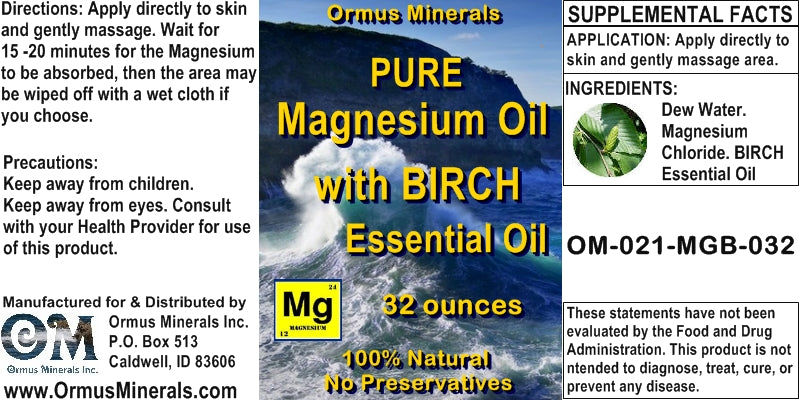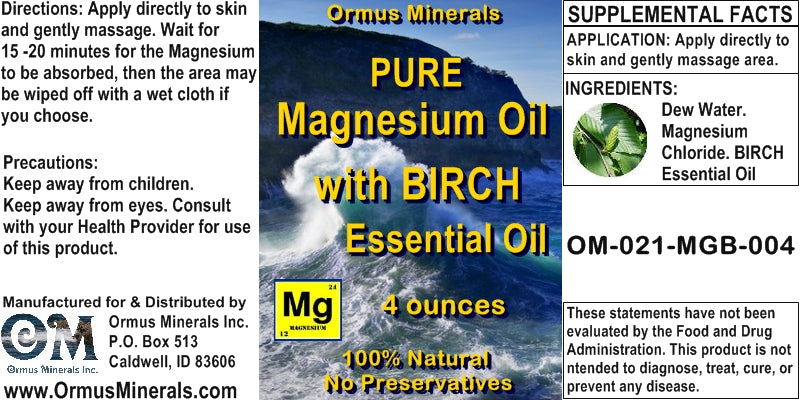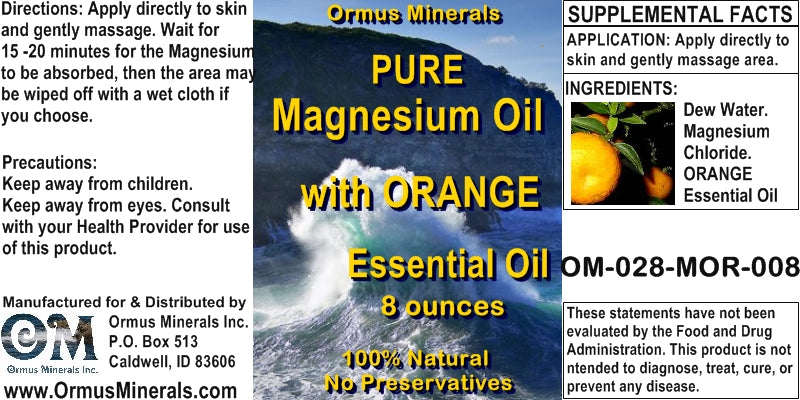
Pure Magnesium Oil w Esssential Oils
Reliable shipping
Flexible returns
|
Ormus Minerals |
Magnesium is an essential mineral involved in over 300 biochemical reactions in the body. It plays a crucial role in muscle and nerve function, energy production, bone health, blood sugar regulation, and blood pressure control. Many people in Western countries may not get enough magnesium through their diet.
Magnesium "oil" isn't actually an oil, but rather a concentrated solution of magnesium chloride dissolved in water, which has an oily feel. It's applied topically to the skin, with the idea that magnesium can be absorbed transdermally (through the skin), bypassing the digestive system.
Here are some of the claimed benefits and what the science says:
Claimed Benefits (and some scientific evidence):
- Muscle Relaxation and Pain Relief: This is one of the most common reasons people use magnesium oil. Magnesium is vital for proper muscle function and relaxation. Proponents claim that applying it topically can help alleviate muscle cramps, soreness, and spasms, particularly after exercise. Some small studies suggest it may help with pain associated with conditions like fibromyalgia and peripheral neuropathy.
- Improved Sleep Quality: Magnesium helps calm the nervous system and supports the production of GABA (gamma-aminobutyric acid), a neurotransmitter that promotes relaxation and sleep. Many users report improved sleep when using magnesium oil before bed. While oral magnesium has more robust evidence for sleep improvement, topical application is thought to offer a similar calming effect.
- Stress and Anxiety Reduction: By influencing neurotransmitters and potentially helping to regulate cortisol levels (a stress hormone), magnesium is believed to help reduce stress and anxiety. Applying magnesium oil may contribute to a sense of calm.
- Bone Health: Magnesium is essential for bone health, influencing bone density and regulating calcium and vitamin D levels. While oral magnesium is well-established for bone health, the direct impact of topical application on systemic bone health is less clear.
- Skin Health: Magnesium has anti-inflammatory properties and may help soothe irritated skin, balance moisture levels, and potentially aid in conditions like psoriasis and eczema.
- Headaches and Migraines: Some individuals with low magnesium levels experience more frequent or severe headaches and migraines. Magnesium's role in neurotransmitter function and blood circulation may contribute to relief.
- Constipation Relief: While primarily associated with oral magnesium (which acts as a laxative by drawing water into the stool), some users report topical application contributing to overall relaxation that may indirectly aid digestion.
- Exercise Recovery: By assisting with muscle relaxation and potentially reducing lactic acid buildup, magnesium oil is sometimes used by athletes for post-workout recovery.
Important Considerations and Scientific Evidence on Absorption:
While anecdotal evidence and user testimonials for magnesium oil are plentiful, scientific research on the absorption and systemic benefits of topical magnesium is mixed and generally less robust than for oral magnesium supplementation.
- Absorption Debate: The skin acts as a barrier, and the extent to which magnesium can effectively penetrate the outer layers of the skin to reach the bloodstream is a subject of ongoing debate. Some studies suggest a modest increase in blood magnesium levels, particularly in non-athletes, and that absorption may occur primarily through hair follicles. Other research suggests that transdermal absorption is minimal at best compared to oral intake.
- Bypassing Digestion: The main appeal of magnesium oil is the idea that it bypasses the digestive system, which can be beneficial for individuals who experience gastrointestinal issues with oral magnesium supplements.
- Not a Replacement for Severe Deficiency: If you have a significant magnesium deficiency, dietary changes and/or oral supplements are generally considered more effective and reliable ways to increase your magnesium levels.
- Tingling Sensation: It's common to experience a tingling or itching sensation when first applying magnesium oil, especially if you are magnesium deficient. This usually subsides with continued use.
- Application: Magnesium oil can be sprayed directly onto the skin (torso, legs, arms, feet are common areas), massaged in, or added to bathwater (magnesium flakes are also used for this purpose). It can be left on or rinsed off after 20-30 minutes.
Before Using Magnesium Oil:
- Consult a Healthcare Professional: Always speak with your doctor before starting any new supplement, including magnesium oil, especially if you have underlying health conditions (like kidney disease or heart issues) or are taking other medications. They can advise on proper dosage and whether it's appropriate for you.
- Dietary Sources First: The best way to get enough magnesium is through a balanced diet rich in magnesium-containing foods like leafy greens, nuts, seeds, whole grains, and dark chocolate.
In summary, while magnesium is a vital mineral with many benefits, the effectiveness of magnesium oil for systemic absorption and addressing magnesium deficiency is still being researched. Many users find it helpful for localized relief of muscle pain, relaxation, and improved sleep.
Essential oils options
Birch Essential Oil, Cassia Essential Oil, Frankincense Essential Oil, Frankincense & Myrrh Essential Oils, Himalayan Cedar Wood Essential Oil, Lavender Essential Oil, Myrrh Essential Oil, Orange Essential Oil, Peppermint Essential Oil, Ylang Ylang Essential Oil.
